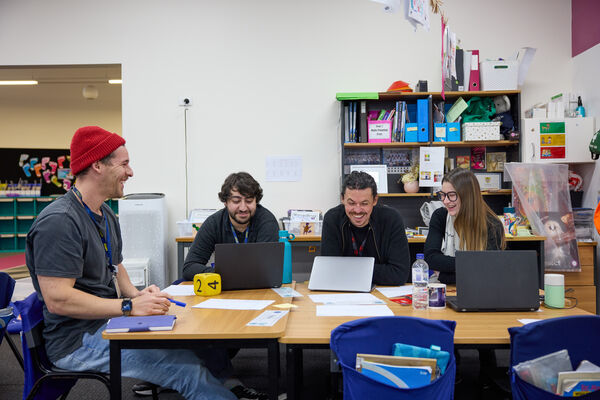Overview
Alignment with Be You Domains
-
Mentally Healthy Communities
-
Family Partnerships
-
Learning Resilience
Alignment with Australian Curriculum
- Health and PE
Target audience
- Primary school
- Secondary school
Target groups
- Whole school
Aims
The Real Schools Partnership aims to foster a strong culture, build effective relationships, resolve conflict in healthy, consistent ways, improve student behaviour and reduce bullying.Program theory
Real Schools's approach is built on research around human sociology and brain science, specifically, the affect theory developed by Silvan Tomkins and Donald Nathanson. The program uses restorative practice theories drawn from Australian researchers and practitioners, including Terry O’Connell, Marg Thorsborne, Peta Blood and Kristen Reimer. Real Schools CEO Adam Voigt developed the theoretical framework and model.Topics
Broad topics addressed through the program are conflict, conduct, language, culture, bullying and healthy relationships.Cost
Program structure
A trained and experienced former school principal supports each school for 3 years to implement restorative practices as the sound, strong and relational underpinning of the school’s culture.Instructor
- Educator
Instructor training
Full-day professional development session for all staff and a Real Schools in-class support day. One-to-one leadership mentoring and teacher coaching is also available.Supporting resources or materials available with program
- Online webinars
- Workbook
Other materials
Supportive implementation resources include sequenced lesson plans for Primary and Secondary teachers aligned to the Australian Curriculum. Staff will also have access to the Real Schools Member Archive, including articles on Teachers' Practice and Cultural Leadership. It also includes videos, webinars, ebooks, white papers, Individual Behaviour Planning resources, newsletter blurbs and a Student Leadership Program.Ongoing support
There is optional Individual Teacher Coaching and Leadership Coaching available. In each year of the partnership, an expert facilitator will provide an annual professional learning day, in-class support for teachers, mentoring, email and phone support, practical resources, and parent engagement sessions.Parent involvement
- Attend information sessions
- Follow-up information provided after program
- Written information provided to parents
- Online resources
Origin of program
Australia
Real Schools
Program authors
Adam Voigt
- Office 2, 5-35 Progress Street,Mornington VIC 3931 Australia
Ratings
Summary of evidence factors
This is a summary of the evaluation or research study characteristics that contribute to the program’s evidence rating.
|
Positive impact on at least one outcome for children and/or young people?
The study reported positive outcomes. |
Yes |
|---|---|
|
Link between program description and theory of change
Theory of change refers to whether there was a comprehensive description and illustration of how and why a desired change is expected to happen in a particular context. |
None |
|
Study design
Type of study design reported. |
Pre-post cohort |
|
Independence
The degree to which the program authors were involved in the research. |
Completely |
Summary of implementation factors
This is a summary of the program’s characteristics that contribute to its implementation rating.
|
Feedback sought from participants
Participants enjoyed the program and understood its benefits. |
Yes |
|---|---|
|
Feedback sought from instructors
Instructors enjoyed the program and understood its benefits. |
Yes |
|
Groups program is not suitable for
Groups the program wouldn't be suitable for or that required further research to determine suitability. |
Not assessed |
|
Training provided during study
The model of training provided. |
Face to face, all instructors, in person |
|
Ongoing instructor support provided during study
Whether ongoing support is provided. |
Yes |
Context
This is a summary of the context in which the evidence for the program was established.
|
Study Participants
Pre school, primary school (Foundation to Year 6), secondary school (Years 7 to 12). |
Primary school Secondary school |
|---|---|
|
Country of Study/s
The location in which the evidence or research was conducted. |
Australia |
|
Location of Study/s in Australia
The state (or states) the program was assessed in Australia. |
|
|
Evaluation of program in culturally and linguistically diverse populations
Provider has included culturally and linguistically diverse people when assessing the program. |
No |
|
Evaluation of program in Aboriginal and Torres Strait Islander children and young people
Provider has included Aboriginal and Torres Strait Islander peoples when assessing the program. |
No |
|
Evaluation of program in low socioeconomic groups
Program has evaluated a diverse socio-economic population in their research. |
Yes |
|
Developmental based adaptations to program design and delivery
Shorter sessions for younger students or activities are adjusted for age appropriateness. |
No |
|
Evaluation of program in children and young people with disability and/or learning difference
Provider has included participants with a disability or learning difference when assessing the program. |
No |
Last updated: 4 April 2024
